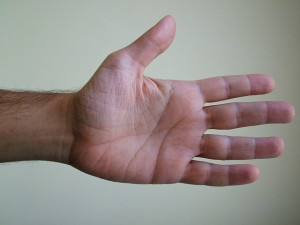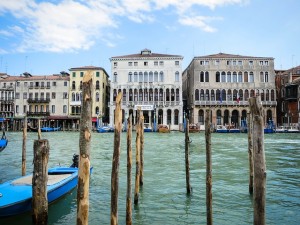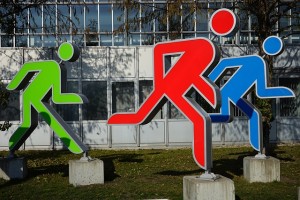in (less than) no time
[Dutch phrase of the week]
[in een hand-om-draai] ![]()
 Literally ‘in the turn of a hand’ this says that something can be done quickly and without effort, with one move of the hand… So, let’s do this DWOTD in een handomdraai!
Literally ‘in the turn of a hand’ this says that something can be done quickly and without effort, with one move of the hand… So, let’s do this DWOTD in een handomdraai!
Examples:
– “Ik moet een knoop van mijn jas vastzetten, pff…” – “We vragen het wel aan mijn moeder, die doet dat in een handomdraai!”
(“I have to fasten one of the buttons of my jacket, pff…” – “We’ll ask my mother, don’t worry, she does that in no time!”)
– “Het is ongelofelijk mensen, koop nu de Ultra-200 Magic Mop en uw vloer is brandschoon in een handomdraai!”
(“It’s incredible people, purchase the Ultra-200 Magic Mop right now and your floor will be spotless in less than no time.” Note the adjective ‘brandschoon’: spotless; literally ‘burning clean’.)
– “Het ziet er leuk uit dat spul van Apple, maar die Airport express krijg ik echt niet aan de praat!” – “Laat mij maar, ik configureer dat ding in een handomdraai!”
(“Those Apple goodies all look great, but I just can’t get that Airport express to work!” – “Let me take a look, I’ll configure the thing in no time!” Note the expression ‘iets aan de praat krijgen’; literally ‘to get something to talk’ this is exclusively used for ‘trying to make or get something to work’ (equipment, machinery etc.))
Related words:
– Hand: hand [noun] [de hand, de handen].
– Omdraaien: to turn (around) [verb] [draaide om, omgedraaid].
– Snel: quick(ly), fast [adjective/adverb].
– Makkelijk: easy [adjective/adverb].




 The earliest version of this saying is “dat staat als een paal”: it’s as firm as a pole in the ground. The current ‘boven water’ version probably has to do with ‘meerpalen’: mooring posts.
The earliest version of this saying is “dat staat als een paal”: it’s as firm as a pole in the ground. The current ‘boven water’ version probably has to do with ‘meerpalen’: mooring posts. A ‘hardloper’ literally translates as ‘somebody who walks fast’; the word is typically used in the context of sports (a ‘runner’ or ‘jogger’). The noun ‘doodloper’ one only encounters in today’s phrase; it’s derived from the verb ‘doodlopen’ which means ‘to lead nowhere, to come to a dead end’. There is also the reflexive verb ‘zich doodlopen’: to walk oneself to death. Both could be applicable here; the phrase ‘hardlopers zijn doodlopers’ says that when you begin too quickly on something, you may not last until the end. It’s also used to say that you shouldn’t rush into things and take your time to do something properly.
A ‘hardloper’ literally translates as ‘somebody who walks fast’; the word is typically used in the context of sports (a ‘runner’ or ‘jogger’). The noun ‘doodloper’ one only encounters in today’s phrase; it’s derived from the verb ‘doodlopen’ which means ‘to lead nowhere, to come to a dead end’. There is also the reflexive verb ‘zich doodlopen’: to walk oneself to death. Both could be applicable here; the phrase ‘hardlopers zijn doodlopers’ says that when you begin too quickly on something, you may not last until the end. It’s also used to say that you shouldn’t rush into things and take your time to do something properly.